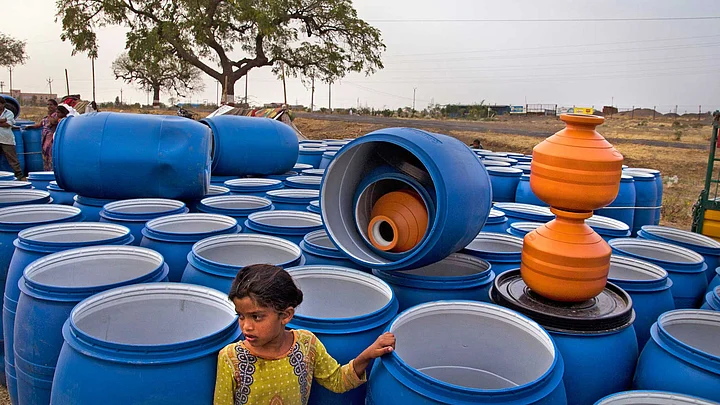In 2015, Bill Gates drank water distilled from human faeces. “The water tasted as good as any I’ve had out of a bottle. And having studied the engineering behind it, I would happily drink it every day,” he wrote in the blogpost that aimed to promote an innovative technology that could generate water for millions.
More than 330 million Indians face acute shortage of water i.e. no water to drink, cook or for personal hygiene. Each year 7,80,000 deaths in India take place due to contaminated water.
Water crisis in India has gone alarming from being worse. But, then there are possible technological solutions to solve this crisis.
Picture this – an Ulta Chhata to capture all your rain water and tunnel it through filters to get potable water or a water ATM that lets you ‘withdraw’ purified water as and when you want, at a minimal cost, or an app that informs youth about the water supply in your area and helps administration to track faults and leakages in water supply.
With an increasing demand, water is a fast-diminishing natural resource. The imbalance of availability and demand leads to disputes. India has more than 12 inter-state water disputes with almost every major state in India, entangled in a legal battle, claiming its right over the neighbouring river.
With a growing need of water, can water start-ups offer a technological solution to water crisis in India? Can a country of one billion populace look towards social entrepreneurs to put an end to India’s ever-growing water disputes like Cauvery?
During a trip to Europe, engineer Samit Choksi and his architect wife Priya Choksi spotted several inverted canopies. This triggered the idea of Ulta Chaata – an inverted canopy-like structure – that can capture, harvest, and purify rain water. Samit and Priya then founded Think-phi, an environment goods and services startup to solve an eternal problem- shortage of water.
Water is a free resource in india. So people here don’t value it. Nobody in India knows the real cost of water, and that is why wastage of water is a huge issue in India. Ulta Chaata can collect, channelise and purify rain water in affordable cost.Samit Choksi, Founder Think-Phi
The big breakthrough for Think-phi came last year when Godrej invested and placed an order of 40 units for one of their factories. Understanding the Indian market, Samit and his team are constantly busy modifying and improving the product.
We have now added a low-priced filter box to Ulta chaata, so that the rain water can be used as potable water. We have also incorporated solar surfaces so that during the non-monsoon months, the product can be used to generate solar energy. Our filters can also be used to filter municipal water supply. In the cost of less than a lakh, you can generate potable water for more than 400 people.Samit Choksi, Founder Think-Phi
Harvesting water is not the only domain targeted by water start-ups, water ATMs that came into existence in 2008, are in fact the oldest, most-popular and widely-implemented technological solution to water problem.
Brainstorming possible technological solutions to the problem of contaminated water, and women travelling long distances to fetch water, Piramal foundation in 2008 piloted a ‘water ATM’ idea and how it works is simple.
A water tank connected to an RO plant pumped, filtered and stored water in a separate tank. With the help of a pre-paid card, the villagers could ‘withdraw’ 1 litre, 5 litres or 10 litres of water. With the help of ‘Soochak’ – a remote monitoring device, which can be mounted on the water purification plant, the minute-by-minute status of the machine can be monitored by somebody sitting at the head office and local centres of Sarvajal project.
Water ATMs soon became a revolutionary ‘invention’. In partnership with the state governments, water ATMs are now functional across 12 states in India.
There is still an argument that water is a basic human right and therefore, shouldn’t be priced at all. But by pricing the water at a low cost, we ensure long term accessibility of the resource. Our customers value water and this leads to less water wastage. Now they are not using potable water to feed or bathe their cattle, both of which happened in Sarvajal’s early days, before our priced-model.Alessandra Kortenhorst, Fellow at Piramal Sarvajal
Environment goods and services is a trillion dollar industry. In India, market is estimated to be between 10 to 12 billion. A majority of this, however, belongs to solar energy solutions. Investments in water start-ups in India are still very low.
In the rest of the world – specially countries like Singapore, US or Germany – water is an expensive resource. So you see more and more companies investing into water products and water start-ups. In India the potential is much bigger, but you still find very few water start-ups.Samit Choksi, Founder Think-Phi
Most entrepreneurs struggle because government departments are the only buyers. Bureaucratic systems are complex and striking deals is tough. If the project is through, payments are never on time.
From de-salination and recycle technologies – that can make impure water usable – to simple apps that can manage supply, metering and wastage of water, the potential for water start-ups is huge. Only if, governments are ready to think out of the box and try to find solutions, outside courts.
